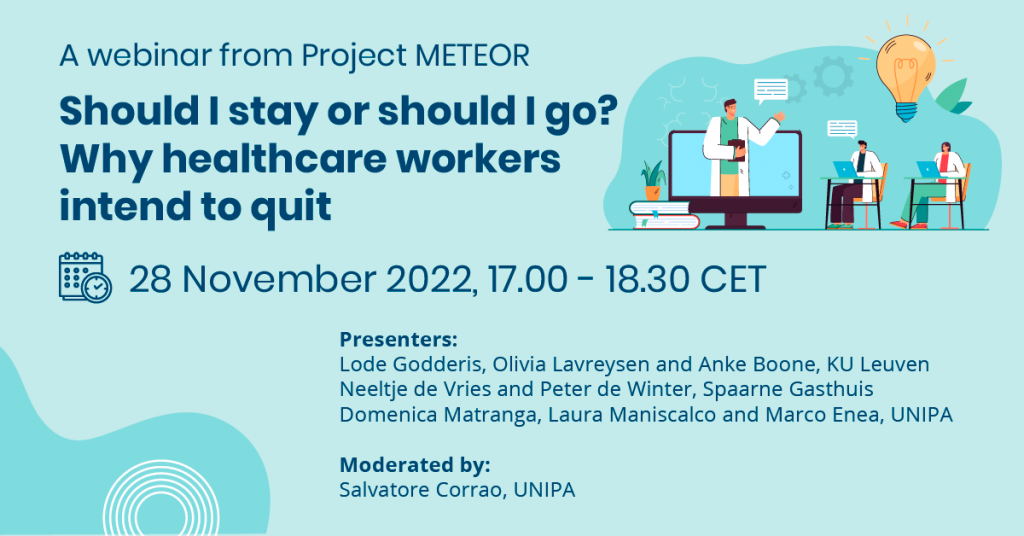Members of Meteor research consortium presented the project’s first results during an online seminar on 28 November 2022 titled “Should I stay or should I go. Why healthcare workers intend to quit”. The event, organised by Meteor partner UNIPA, brought together more than 40 participants, including healthcare scholars, doctors and nurses, and featured five presentations.
Olivia Lavreysen (KU Leuven) opened the seminar by introducing Meteor’s objectives and expected outcomes. Lavreysen showed how the project aims to build on existing research and use surveys and co-creation workshops on identifying key factors influencing healthcare professionals’ decisions to quit their jobs or their intention to do so. She also emphasised that based on the findings, researchers will develop policy proposals and build a toolbox to help healthcare providers with retention challenges.
In the following presentation, “Determinants and interventions regarding retention for healthcare workers”, Peter de Winter (Spaarne Gasthuis) talked about the findings of a systematic review of the literature on the determinants of nurses’ and physicians’ intentions to leave, and on interventions that hospitals take to retain their workforce. Personal characteristics such as level of experience, gender and age, together with working conditions and salary levels, are key determinants of job decisions.
Domenica Matranga (UNIPA) presented the results of a survey of 1,554 nurses and 492 physicians from eight hospitals in Belgium, the Netherlands, Italy and Poland, which aimed to assess the impact of numerous factors on decisions to change jobs. The result shows that nurses’ inclination to change their workplace is higher when their level of emotional exhaustion increases, and when they start feeling more detached from their work. At the same time, job satisfaction and engagement make them less likely to quit. Similar results were found for doctors, where detachment from work and job satisfaction are two main determinants that trigger decisions to change jobs.
Two UNIPA researchers, Laura Maniscalco and Marco Enea, discussed the survey results further. Maniscalco focused on factors influencing physicians’ employment decisions, while Enea assessed those of nurses. In addition to the factors mentioned by Matranga, in their analysis the researchers also considered such variables as country of origin, age, sex, family situation, seniority, health problems and experience with the Covid-19 pandemic.
The intention to change jobs varies between countries and age groups. Maniscalco showed that among physicians who are equally unsatisfied with their jobs, had to do nightshifts and had health issues earlier, the predicted probability of leaving the profession is more than 20% in almost all countries. Age is another significant factor: younger doctors have much higher intent to leave their hospital and move to another one. Enea analysed nurses’ intention to leave a particular employer and the profession itself. Within the group of highly unsatisfied nurses, with a high burnout risk, the predicted probability of the intention to leave their hospital varies across countries in a range between 60%-87% for a nurse at his/her first work experience, and between 40% and 75% for a 50-year-old one.
Enea concluded that hospitals should pay more attention to young employees and find ways to retain them. The differences between countries show that there is no place for a one-size-fits-all solution to the problem of retention, as several factors play a role in healthcare workers’ career decisions.
The presentations were followed by a question and answer session and a lively discussion with the participation of attendees.




